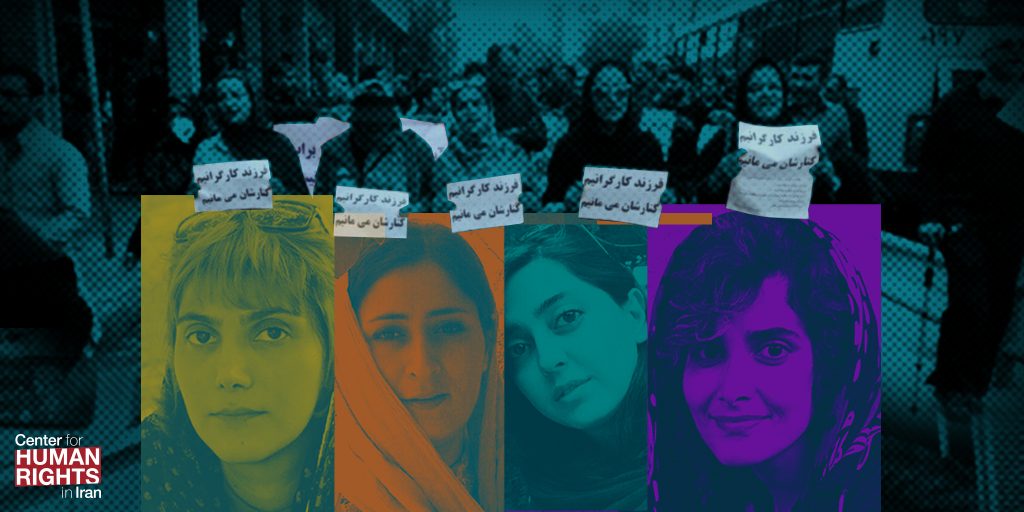CHRI – Four women arrested on May 1, 2019, after attending a Labor Day rally in Tehran should be allowed unrestricted access to counsel and released, said the Center for Human Rights in Iran (CHRI).

The women—journalist Marzieh Amiri and activists Neda Naji, Atefeh Rangriz, Anisha Asadollahi—were all charged with national security crimes after peacefully attending the protest and then denied bail.
Marzieh Amiri
Journalist Marzieh Amiri, 32, was covering the Labor Day rally for the reformist Shargh newspaper when she was arrested near Baharestan Sq. in front of the Parliament building.
An undergraduate student in sociology at the University of Tehran, Amiri was on July 3 taken to Branch 28 of the Revolutionary Court presided by Judge Mohammad Moghiseh and charged with “assembly and collusion against national security,” “propaganda against the state” and “disturbing public order.”
“Marzieh Amiri’s condition is worrisome,” her sister Samira Amiri tweeted July 13. “Her blood pressure is constantly low, she’s always dizzy, has bleeding in her digestive track and has contracted a skin disease. Marzieh has epilepsy and on one occasion she suffered an epileptic attack while in solitary confinement. The prison authorities have ignored our requests to transfer Marzieh to the hospital.”
In June, 30 academics at the University of Tehran signed a letter urging Minister of Science, Research and Technology Mansour Gholami to seek her release.
Amiri was previously arrested on March 8, 2018, at a rally in front of the Labor Ministry in Tehran on International Women’s Day. She was released four days later.
Atefeh Rangriz
Women’s and civil rights activist Atefeh Rangriz, 31, is currently in Evin Prison and has been charged with “assembly and collusion against national security” and “disturbing public order.”
Judicial authorities on three occasions promised Rangriz, who has a B.A. in sociology, that she would be freed on bail, a source close to the family told CHRI on July 14, 2019, on condition of anonymity.
Rangriz was initially held in Gharchak Prison but transferred to Evin Prison after a court hearing on July 9.
“Her mother… went to the revolutionary court [in Tehran] and she was told her daughter’s case had been submitted for trial but has not been registered yet, which means her release on bail will be delayed,” said the source who requested anonymity for security reasons.
Rangriz has chosen a lawyer but the court has not yet approved her choice, added the source.
Neda Naji
Labor rights activist Neda Naji, 30, was taken to the Vozara Detention Center for Morality Security after being arrested at the rally, and transferred to the Intelligence Ministry-controlled Ward 209 of Evin Prison on May 2, according to her husband Jamal Ameli.
She has been charged with “assembly and collusion against national security” and “disturbing public order.”
On June 16, Naji, who has a B.S. in chemistry, was transferred to Gharchak Prison in the city of Varamin, south of Tehran, but was returned to Evin Prison after a court hearing on July 9.
On July 11, her husband said on Twitter that she had been unexpectedly denied bail:
“Two days ago, the case investigator said he would allow her to post bail at 500 million tomans [approximately $118,600 USD] but now he says the prosecutor has not agreed to it! There’s no sign she will be freed before her trial despite the fact that the preliminary investigations were completed weeks ago. They are punishing her without holding a trial.”
Anisha Asadollahi
Anisha Asadollahi, who taught English to members of the Union of Workers of the Tehran and Suburbs Bus Company, was detained during the Labor Day rally and taken to Evin Prison. Her age is unknown.
She was released that day but rearrested on June 18 by Intelligence Ministry agents, who searched her home and confiscated her laptop and computer hard disks.
The charges against her have not been announced.
According to Article 27 of Iran’s Constitution, “Public gatherings and marches may be freely held, provided arms are not carried and that they are not detrimental to the fundamental principles of Islam.”
But security forces and the judiciary treat peaceful activism as a national security offense; independent labor unions are not allowed to function, strikers are often fired and risk arrest, and labor leaders are consistently prosecuted under catchall national security charges and sentenced to long prison terms.
 Shabtabnews In this dark night, I have lost my way – Arise from a corner, oh you the star of guidance.
Shabtabnews In this dark night, I have lost my way – Arise from a corner, oh you the star of guidance.


